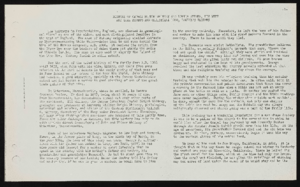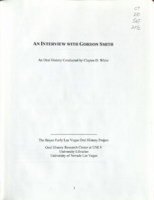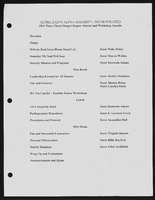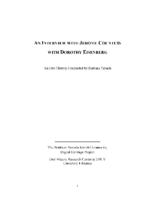Search the Special Collections and Archives Portal
Search Results
Helen J. Stewart Papers
Identifier
Abstract
The Helen J. Stewart Papers (1869-1978) document the life of Las Vegas, Nevada pioneer, Helen J. Stewart. It includes correspondence between Stewart and her children as well as various family legal papers and certificates. The collection also contains Helen J. Stewart's 70th birthday scrapbook, a ledger, and a day book from 1904-1919, as well as several photograph albums and information related to the family burial plot.
Archival Collection
Joshua Abbey Papers
Identifier
Abstract
Collection is comprised primarily of files from approximately the early 1980s to 2017 detailing Joshua Abbey's theater and film career; his involvement with environmental efforts in Southern Nevada such as the Citizens Against Nuclear Waste in Nevada (CANWIN); and his involvement with the Jewish community in Las Vegas, including the Jewish Film Festival, the Jewish Federation, Temple Beth Sholom, and other organizations. The collection also includes information about the Jewish Community Center from the 1950s and a file on the film production of
Archival Collection

History of George Burton Whitney and Lovina Syphus, his wife and Luke Syphus and Christiana Long, Lovina's parents, undated Genealogical data sheet, John Mathieson Bunker and Mary Etta Syphus
Archival Collection
Description
From the Syphus-Bunker Papers (MS-00169). The folder contains documents about the history of George Burton Whitney and his wife, Lovina Syphus, and Luke Syphus and Christiana Long, Lovina's parents, and a genealogical data sheet for John Mathieson Bunker and Mary Etta Syphus.
Text

Transcript of interview with Jarmilla McMillan-Arnold by Claytee D. White, October 7, 2010
Date
Archival Collection
Description
Jarmilla McMillan-Arnold’s father, Dr. James B. McMillan, was the first black dentist in the state of Nevada. Dr. McMillan’s colleagues consisted of Dr. West, the first black medical doctor in the state, and Dr. Ice, the first black surgeon in Nevada. This interview highlights and archives the solid foundation upon which Nevada’s black community was built. Jarmilla recalls early memories of growing up as the daughter of Las Vegas NAACP president Dr. McMillan. She was born in Detroit, Michigan, to a Caucasian and Indian mother who was a professional dancer. Jarmilla’s parents separated when she was very young and as a result she was raised by her paternal grandmother who owned a restaurant in Pontiac, Michigan. Jarmilla describes her grandmother as being well-known and highly regarded in the community where she maintained her business. Jarmilla attended Catholic schools in Detroit, Pontiac, and Las Vegas. Having moved to Las Vegas with her father, Jarmilla’s narrative offers keen insigh
Text

Transcript of interview with Justice Michael Cherry by Barbara Tabach, September 19, 2014
Date
Archival Collection
Description
Interview with Justice Michael Cherry by Barbara Tabach on September 19, 2014. In this interview, Justice Cherry talks about how he came to Las Vegas and his work as a public defender and as a lawyer in private practice. He also discusses his involvement with Jewish organizations in various capacities, and his involvement with high-profile cases such as the MGM Grand and Las Vegas Hilton fires, earning him the nickname "master of disaster."
Justice Michael Cherry was born in St. Louis, Missouri, and went on to spend his childhood in the Jewish neighborhood of University City. He attended University of Missouri and became a leader in his fraternity, Alpha Epsilon Pi, and a committed ROTC cadet. By the time Justice Cherry graduated from Missouri and was heading to Washington University School of Law, he was a second lieutenant; halfway through law school, he was promoted to first lieutenant. It was also during law school that he married his college sweetheart, Rachel Wolfson. When a bad back prevented him from becoming an active air force officer, he and his wife decided to follow his mother to Las Vegas. Justice Cherry worked both as a law clerk with the Public Defender's Office as well as a security guard at Wonder World when he first moved to the city. After passing the Nevada bar, Cherry took at position with the Public Defender's Office, and later went into private practice as a successful criminal defense attorney. Cherry was elected as district judge in 1998 and 2002. In 2006, he won his campaign for state Supreme Court justice. Justice Cherry was reelected to office in 2012 for another four-year term. He is currently the highest-positioned Jewish official in the state of Nevada. Throughout his years in Las Vegas, Justice Cherry has been an extremely active and influential member of the Jewish community and served as chairman of the Anti-Defamation League and is active in the Jewish Federation. Justice Cherry attributes his commitment to service to his mother. In addition to his service to the Jewish community, he has been active in numerous other service organizations, including March of Dimes, Olive Crest, Adoption Exchange and American Cancer Society.
Text

Transcript of interview with Stephen La Thair Hawley by Donna Mattson, June 24, 1975
Date
Description
On June 24, 1975, collector Donna Mattson interviewed native Nevadan mechanic, Stephen La Thair Hawley, (born October 15th, 1936, in Ely, Nevada) in his home in Las Vegas, Nevada. This interview offers a historical overview of early Las Vegas including gambling and an in-depth discussion on local economic, environmental, and social changes.
Text

Transcript of interview with Gordon Smith by Claytee White, January 29, 2013
Date
Archival Collection
Description
Gordon Smith was born in Utah, but moved with his family to Babbitt, Nevada in 1947. His father, a barber, moved the family to Las Vegas in 1955. In this interview, Gordon recalls school and after-school pursuits; changes in the town; summer jobs; and college. He also talks about his military service and returning to Las Vegas to take up the razor himself - starting a successful barbering business of over 30 years.
Text

Alpha Kappa Alpha Sorority, Theta Theta Omega Chapter retreat: agenda and meeting documents
Date
Archival Collection
Description
From the Alpha Kappa Alpha Sorority, Incorporated, Theta Theta Omega Chapter Records (MS-01014) -- Chapter records file.
Text

Transcript of interview with Harriett Thornton Hicks by Claytee D. White, October 28, 2009
Date
Archival Collection
Description
Harriett Thornton Hicks was born June 8, 1913,in Parowan, Utah; the thirteenth child of 14. She tells of her pioneer family who dwelled in two log cabins—one for cooking and one for sleeping. In 1931, she moved to Las Vegas to join two older sisters who had relocated here. She was picked up at the train by young Charles Hicks, who was a friend of her sisters. Charles had a car and offered to provide transportation. Within three years, the two were married. She quit her drug store job to raise a family and he worked for the railroad, the only business at the time in Las Vegas. At the age of 96, Harriett recalls a range of community milestones, such as the Boulder Dam, the news of Pearl Harbor bombing, Fremont Street, the Biltmore Hotel, and how to live in a city with mob influences.
Text

Transcript of interview with Jerome Countess and Dorothy Eisenberg by Barbara Tabach, October 28, 2014
Date
Archival Collection
Description
Interview with Jerry Countess and Dorothy Eisenberg by Barbara Tabach on October 28, 2014. Countess discusses his childhood and military life. He became involved in the United Jewish Appeal in Las Vegas and started the Jewish Reporter newspaper. Dorothy Eisenberg is also involved in the interview to discuss the Jewish Federation and the Jewish community.
Jerome Countess, known as Jerry to most, was born on December 22, 1920 in Brooklyn, New York. He grew up in the borough's Jewish neighborhood, and he developed a reputation for being a skillful handball player and a great dancer. Though he was not allowed to enlist in the U.S. Coast Guard due to colorblindness, Jerry was eventually drafted into the army during World War II. With very minimal combat training, Jerry was sent to North Africa as an infantryman, and was later stationed in Italy. After three years of service, Jerry returned home and married his childhood sweetheart, Rachel, in 1945. Using the G.I. Bill, he enrolled at New York University to study writing, though he quit just shy of graduation as his wife was expecting. After briefly working in the television broadcasting industry, Jerry landed a job with the United Jewish Appeal. In 1975, following in his desire to move west, Jerry took the job of executive director of the Combined Jewish Appeal in Las Vegas, what would soon be renamed the Jewish Federation of Las Vegas. Under his leadership, the federation started the Jewish Family Service as well as The Jewish Reporter, a monthly publication to promote engagement of the Jewish community. Jerry served as the executive director of the federation for many years, serving at the pleasure of many board members and presidents, including the first female federation president, Dorothy Eisenberg.
Text
